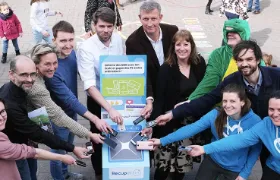Stop dreaming, start doing: Eight & Proximus supply basic income for the villagers of Lutala
Setting up a grocery shop. Putting a new roof on a house. Installing a solar kit. These are just some examples of how the inhabitants of Lutala, a small village in Congo, are spending the financial injections they're receiving – thanks to a collaboration between Proximus, Umicore and the non-profit organization Eight. It's part of Proximus' bigger mission to become a fully circular company by 2030. But why Lutala? It all started with an initiative to collect old mobile phones.
More than 3 million discarded mobile phones, just lying around in boxes, drawers, attics and basements. As it turned out, in Belgium, less than 5% of old mobile phones were recycled at that point. All while 90% of the raw materials used in them – like copper, gold and cobalt – are recyclable. It was the starting point for Proximus to team up with Umicore to try and change that. Together, we set a goal to collect as many mobile phones as possible, take them apart and recycle their raw materials. A process we call 'urban mining' – it's much more sustainable than traditional mining.
The initiative was also a trigger for Proximus to zoom in on what's happening in areas where the extraction of raw materials takes place. The environmental impact of artisanal mining is well-known and documented: from deforestation to the pollution of rivers, it's not a pretty picture. But the human cost of mining is equally important and shouldn't be ignored. People working in mines often suffer from poor working conditions – not to mention bigger issues like exploitation, corruption and even wars.
As a telecom operator, and one of Belgium's biggest companies, Proximus feels a responsibility to help bring about real change. One way is to spread awareness about these issues and offer people the chance to recycle their old phones at the Proximus shops (in exchange for a coupon or a donation to Eight). Another is by tackling these issues head-on.
Unconditional monthly cash transfers
Enter Eight, the organization Proximus has teamed up with. Eight offers unconditional monthly cash transfers to people in extreme poverty for two years. They break with conventions by guaranteeing people living in poverty a basic income. This way, they have more freedom in deciding how they spend their money. A philosophy that Proximus fully agrees with and for which Eight won the 'Digital for development' prize.
Since October 2021, Proximus and Umicore fund these unconditional cash transfers that are going to the villagers of Lutala, a small mining village in The Democratic Republic of Congo (DRC). The DRC is a country particularly affected by poverty, even though it's one of the richest in the world in terms of mineral wealth. However, this wealth does not lift local artisanal and small-scale mining communities out of poverty. In Lutala, the average monthly income for miners in the DRC is between USD 71.37 and USD 86 per month. 32.5% of the villagers work as tin miners. But 92% see themselves forced to combine mining with another job.
Eight's basic income project has a standard structure. All residents of the village receive a simple mobile phone and a SIM card and a fixed monthly amount that's deposited to their individual mobile bank account. In Lutala, adults receive USD 20, while youngsters under 18 receive USD 10 a month, which goes to the account of their mother or (female) caretaker.
According to Steven Janssens, co-founder Eight, scientific research shows that people who live in poverty “go into survival mode”. He adds: “All they can think about is scarcity. There is no mental room to do anything else. But when the scarcity is lifted, they start taking action. They send their children to school, they seek medical care much sooner, become more entrepreneurial and collaborate more.”
Building a more sustainable world, step by step
The project in Lutala is the first of its kind in the DRC, but it's modelled after similar projects by Eight in four villages in Uganda. And it's already clear the people of Lutala are finding ways to spend the money wisely. From breeding pigs to solar kits, new roofs and the opening of small shops, it seems like Proximus' contribution really is making a difference to people's daily lives. And there's more good news: the project's scaling up beyond the borders of Lutala, and will provide the entire Kalima region with a basic income boost for two years. The full project in collaboration with Fairphone will run until 2026, while the project in Lutala with funding from Proximus and Umicore, will run until October 2023.
What's next for Proximus? Our ambition is to achieve net zero CO2-emissions by 2040 and to become fully circular by 2030. As a company, we're making a clear commitment to actively contribute to a circular economy and a sustainable society. The project in Lutala is just one of many initiatives that prove we're putting our words into action. But there's more: from switching to environmentally friendly packaging to building a greener network and refurbishing devices, we're finding ways to make a difference everywhere we can. And this is just the tip of the iceberg. Behind the scenes, we're already inventing and developing new business and consumption models. Because when it comes to a more sustainable world, it's not about dreaming it. It's about doing it.


